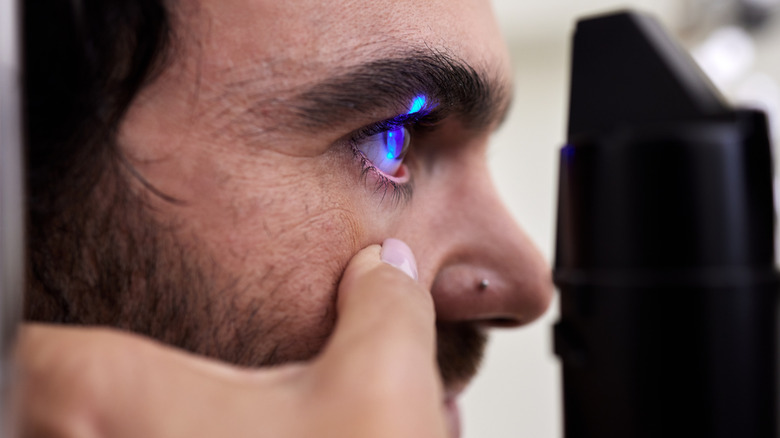
Jose Luis Pelaez/Getty Images
Cardiologists aren’t the only medical specialists who can detect heart-related problems. Ophthalmologists may also sometimes be able to tell if their patients are at risk of heart disease.
Why would your eyes have any bearing on your heart health? Like so many other body parts, the eyes rely on the body’s vascular system to function. Consequently, when vascular issues occur, the eyes — and in particular the retina — may be affected.
The retina is a window into the inner workings of the body, providing a real-time look into whether blood is moving efficiently and properly through blood vessels. If a problem arises, your retina may show changes that you can’t see in the mirror, but your eye doctor can see through noninvasive measures.
For instance, if you’ve ever had a thorough eye examination, you may already have undergone a simple yet effective procedure called a retinal scan. During a retinal scan, the retina is imaged using noninvasive optical coherence tomography tools that map the inner surfaces and workings of your eyes. Based on those images, an eye doctor can determine not just your eye health but your systemic health.
As explained by Dr. Joseph Nezgoda in a 2022 article from the American Academy of Ophthalmology (AAO), eye doctors can be a first-line defense against otherwise undetectable cardiovascular concerns. Explained Dr. Nezgoda, “Your ophthalmologist may be able to take an image of your eye to help find cardiovascular disease earlier than before.”
Markings and streaks may indicate cardiovascular issues

PeopleImages.com – Yuri A/Shutterstock
When interviewed for a 2021 AARP article, Dr. Mathieu Bakhoum expounded on why the retina is such a useful anatomical feature for identifying possible heart disease. He noted that because retinal cells die when they’re deprived of blood, they “leave behind visible damage, a kind of a permanent mark, which we call retinal ischemic perivascular lesions, or RIPLs.”
In fact, anomalies such as tiny marks on a retinal scan can speak volumes about an individual’s heart health. Though marks on the retina can occur for numerous reasons, research shows that they may be signs of a previous eye stroke. Eye strokes happen when blood stops flowing properly within the eye structures. This causes a blockage that disrupts the eye’s normal function and leaves a mark behind. Therefore, seeing a lot of marks may suggest that the patient be evaluated for heart conditions like high blood pressure, coronary artery disease, or elevated cholesterol.
Again, the presence of retinal marks isn’t a surefire indicator of an eye stroke. Phenomena such as eye floaters can also leave marks. Also, you probably won’t feel discomfort if you have an eye stroke or experience signs like floaters, blind spots, or other vision-related problems. That’s why it’s essential to get eye checkups, even if you think that your eyes look fine.
Other eye-related signs of heart disorders

Tualek Photography/Shutterstock
If your eye doctor suspects that you’ve had an eye stroke, you may be advised to undergo one or more treatments. For instance, if eye stroke is the result of high blood pressure, you may be viewed as a candidate for medications that help treat hypertension.
Additionally, your doctor may talk to you about foods to eat and not to eat if you have high blood pressure. Lifestyle changes, including diet, can be natural ways to lower hypertension without medications. Other treatments for eye stroke may involve injections of medications, such as corticosteroids, into the eye or laser therapies.
Eye strokes aren’t the only type of cardiovascular-related symptoms that may indicate you have a more widespread heart-related condition. A diagnosis of age-related macular degeneration (AMD) could be a reason to get a cardiovascular checkup. After all, a Mount Sinai study from 2022 that was published in Retina found a relationship between AMD and heart disease. Cataracts are yet another eye condition that could be partially rooted in cardiovascular problems.
And what if you’re losing your vision? You guessed it: Your eyes could be telling you something important about your heart. A 2022 study from Preventing Chronic Disease concluded that impaired vision might be linked with cardiovascular disease. Specifically, individuals who had vision impairments were at higher risk of both high blood pressure and elevated cholesterol.
Credit: healthdigest.com









